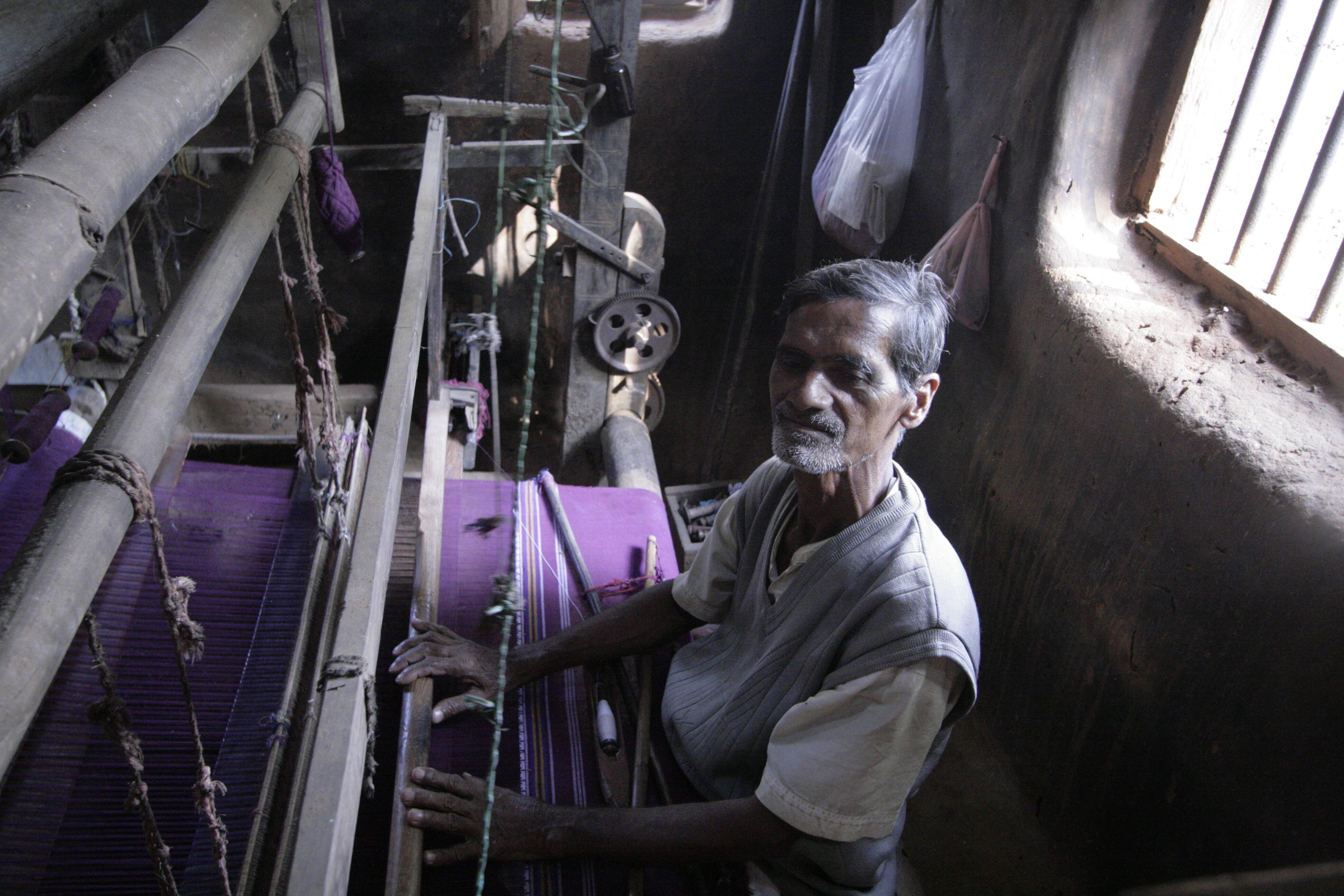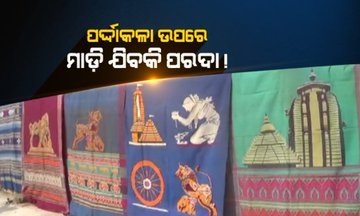Dhalapathar Parda and Fabrics are named after the village of Dhalapathar in Khurda
district of Odisha.
Parda means curtain. The handloom curtains and fabrics of this village are handmade using spinning machines. As they are unique, they have the Geographical Indications (GI) tag.
Type: Handicraft
GI Application# 207
Certificate Date: 17/07/2012
Left image- Dhalapathar Parda woven by Shri Krushna Rout in the year 1945 with the design Taj Mahal.
Apart from weaving Parda and Fabrics, weavers also weave artistic thread designs on Sarees, Lungi, Gamuchhas (towel) etc.
A community known as ‘Rangani’ weaves handloom sarees.
Rangani means ‘Rang’ (colour) and ‘Ani’ (bring) – ‘one who knows the art to
bring colour on cloth’.
Some popular names of Sarees- ‘Kusuma Kapata’, ‘Kankana
Pedi’, ‘Muktapunji’, ‘Nahati’ & ‘Akata’. Previously used during social
functions like weddings and in cultural activities like drama, arrival of
low-cost mill-printed sarees made the weavers use the craft to make Parda.
 |
| Source |
These
fabrics are hand-spun using naturally-coloured thread, made from natural
colours from leaves, fruits and trees. The talented weavers have created many natural
sceneries and floral patterns and designs like Jagannath Temple, Konark Temple,
Lingaraj Temple, Kalasha Hansa (Pot
& Swan), Surya Namaskar, Sunset Scenery, Konark Ghoda (Konark Horse), Ashoka Chakra, India Map, Odisha Map, Bharat Mata etc. on Parda.
#Dhalapathar Parda & Fabrics of Khurda district #Odisha #India - GI Application No. 207.— Odita Trust (@OditaTrust) December 21, 2019
This traditional #handicraft needs support & promotion.
It should be more readily available. #GITag #OdishaGI #GIsofIndia #LetsTalkIP #WahGI https://t.co/gqfaR8kIti
When I first learned about Dhalapathar Parda and Fabrics in 2017 while researching about GIs, I felt so ignorant that I was unaware of this beautiful handicraft from Odisha.
Prof. Dr. K.D.Raju of IIT Kharagpur had facilitated the GI application for Dhalapathar Parda & Fabrics for Odisha State Govt. You can learn about the process, view some wonderful works of art, and skilled weavers in his video -:
Prof. Dr. K.D.Raju of IIT Kharagpur had facilitated the GI application for Dhalapathar Parda & Fabrics for Odisha State Govt. You can learn about the process, view some wonderful works of art, and skilled weavers in his video -:
In 2018, on Prof. Dr. Raju's reference, I was invited to represent Odisha in the BRICS Alliance Business Conclave GI Exhibition at Delhi. When I tried to look for sample pieces of 'Dhalapathar Parda and Fabrics' to carry with me for display in the said exhibition, I was dismayed to not find them in the shops of Bhubaneswar...
I really could not and cannot still understand why and how we were/are facing such a situation- why the lackadaisical attitude and paucity? I continued looking for the samples like crazy.
I really could not and cannot still understand why and how we were/are facing such a situation- why the lackadaisical attitude and paucity? I continued looking for the samples like crazy.
Here is a GI product that is simply not available. That is why it is not known.
After all, like it's said in Hindi- 'jo dikhta hai, wo bikta hai'- what is seen, sells.
Thankfully, Odisha state's handloom cooperation, Boyanika, did have some exquisite sample pieces of Dhalapathar Parda in their safe-keeping. I am really grateful to Shri Devaraja Sahu, the manager of Boyanika, who understood the need to display to represent our state's GI. Thankfully Sahu Babu trusted me, and loaned their precious sample pieces for the purpose.
Promotion is needed for this too, else like some other handicrafts, this too may be hidden behind curtain soon.
 |
| Source: Kanak News |
D For- Dhalapathar
I am writing A-Z posts about the Geographical Indications (GIs) of Odisha #OdishaGI.GI products are linked with the culture, traditions, history, reputation etc. of a geographical location.
Only when info is shared, people can learn and be aware.
This is my sincere attempt to share information about the GI-Tags of Odisha.
You can check out my other GI posts here.
My previous #AToZChallenge posts here.
Are you aware of Geographical Indications?
Had you heard of Dhalapathar Parda and Fabrics?
Please do share in the comments below.


This is so good to know. I konly knew about Sambalpuri and ikat! These look so nice with these prints.
ReplyDeleteYou are doing wonderful work in popularising traditional creations. Maybe the artisans too should be made aware about GI tags.
ReplyDeleteIt is indeed a pity that age old art like hand woven designs are slowly dying. Dhalapathar parda or curtains definitely look beautiful from the images you have preseented. That image of Taj Mahal on the curtain is really beautiful.
ReplyDeleteOur traditional handicrafts and other artistic creations were effectively razed to the ground while the British reigned. They started taking away local raw materials to Britain, producing cloth there with the help of machines, and then selling their produce here.
ReplyDeleteThankfully, Indian handicraft are making a re-emergence with the help of Government schemes and initiatives. But the sad fact is that these items are only likely to have novelty value, and not mass appeal.
Interesting read Anita.
P.s. I seriously did not know you were a doctor till a few moments ago :p
Cheers,
CRD
Do drop by mine.
SCRIPTED IN SANITY
Thanks for sharing these traditional arts, cultures and traditions of Odisha. Good to know the new insights and information!!
ReplyDeleteVery educative and illuminating. May your tribe grow
ReplyDeleteWow! Very informative post. I wasn't aware about talented weavers making Surya Namaskar designs - do share a picture ...it seems really interesting.
ReplyDeleteIt surprising to know from your research work promotion of Dhalapathar parda an hardship art &craft still carry by few weavers with their Heritage craft skills. we craft & art lovers should spread this unique dyeing craft to revive with a new direction mass emplyment in the same region..
ReplyDeleteYes, this is the sad reality.
DeleteVery few weavers are presently associated with this heritage craft. We need to preserve this for the next generation.
More incentives and promotion are needed. Employment opportunities can be and must be generated.
Youth must be aware, learn and share.
I want contact of the weavers who makes dhalapathar parda and fabrics will you pls. Help me
ReplyDeletePlease do send a message via the Contact form of this blog.
DeleteYou could also tweet to- @anitaexplorer.
So nice
ReplyDelete